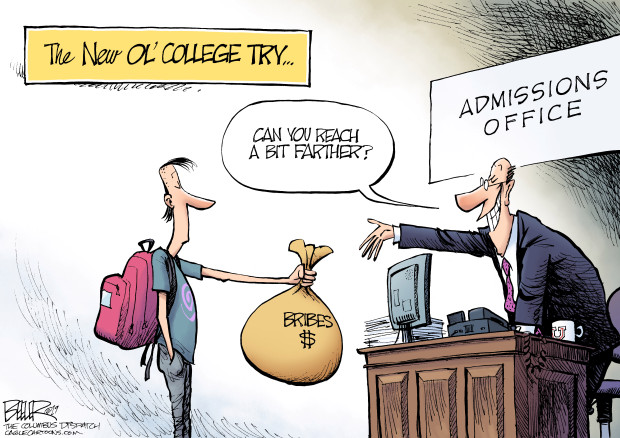College Admissions Scandal is Nothing Out of the Ordinary
Zoe Glasser
The recent allegations of racketeering, bribery, mail fraud that were brought against over 50 people seemed to rock the country, but for students who have experienced the college admission process, it comes as no shock that the wealthy would go to extreme lengths to secure their children’s’ places at top schools. This scandal reflects a much larger issue with the American post-secondary school system that goes beyond paying exorbitant amounts of money for a proctor to correct a student’s SAT test responses.
The scandal, which broke about a month ago, brought to light serious issues with the current system. Most obviously, it confirms the common suspicion that the wealthy simply have a better chance of being accepted to any given college. Although United States affirmative action laws make it illegal for colleges to accept or reject students based on their ability to pay for tuition, many people have speculated that this decision-making process has continued to occur in secret. Now, it is apparent that major universities have found a loophole, with parents bribing recruitment officers to sign their children up for sports they may have never even participated in. This ultimately undermines all the work of affirmative action, as the majority of people committing bribery are white and wealthy.
The wealth-based privilege around which this scandal is based has captured the attention of the news media, but the race bias involved has received much less attention and is equally– if not more– important. Quite simply, the majority of the indicted parents are white. This is an indirect result of systematic racism, but it also demonstrates that it is still extremely difficult for people of color to be accepted to elite schools. As of 2017, 21.2% of the African American community live in poverty, 18.3% of Latinx people live in poverty, and 8.7% of White people live in poverty. In the context of this scandal, this means that African American and Latinx people are less likely to be able to pay for college, and therefore have a smaller chance of receiving admission, irrespective of the impact of affirmative action. This perpetuates the oppression of people of color in the United States by keeping them relatively less educated and forcing them into lower-level jobs.
Because this racism is so ingrained in American society, there is no easy way to fix this scandal or prevent it from occurring again. The best way to reduce the wealth and race inequality is to demand that universities stop taking bribes and to create tighter, stricter regulations to close the loopholes that were exploited in this case. Students must be able to prove that they have participated in a specific sport to be eligible for recruitment, the College Board must make sure that all of its proctors have no affiliation with the students they are proctoring, and there should be limitations on the extent to which private college counselors should be able to interfere with a family’s finances.
If the government addresses this issue by preventing corruption rather than making arrests after it has occurred, the system will begin to heal, and hopefully, so will the inequality.



